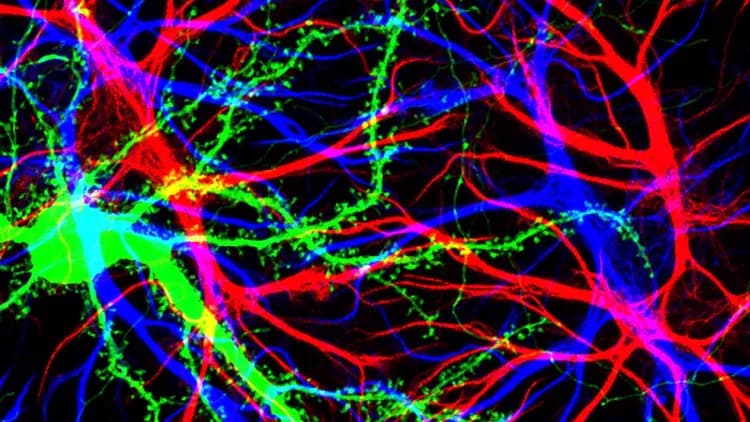
Brain's Finely Tuned System Of Energy Supply Revealed
New research out today in the journal Neuronreveals how the brain is able to meet its massive energy demands with a "just in time" system that delivers oxygen that fuels nerve cells. The findings could shed light on diseases like Alzheimer's and help explain the cognitive decline that accompanies the disease.
"Our brains require a tremendous amount of energy and in order to meet this demand the flow of blood must be precisely choreographed to ensure that oxygen is being delivered where it is needed and when it is needed," said Maiken Nedergaard, M.D., D.M.Sc., co-director of the University of Rochester Center for Translational Neuromedicine and lead author of the study. "This study demonstrates that microvessels in the brain play a key role in reacting to spikes in demand and accelerating the flow of blood to respond to neuronal activity."
Energy in the brain is generated almost exclusively from a form of metabolism that requires oxygen. However, neurons only maintain a small reserve of energy and these cells require a continuous supply of oxygen, especially when the cells are firing and communicating with their neighbors. In fact, the brain's oxygen demands are enormous; despite comprising only 2 percent of the body, our brains consume 20 percent of the body's oxygen supply.
Scientists have long understood that there is a direct correlation between brain activity and blood flow. Using imaging technologies, they have observed that when neurons start to fire there is an accompanying increase in blood flow to area of the brain that is active.
What has not been fully understood is how the blood circulation system in the brain "knows" that it needs to ramp up blood flow to respond to the increased demand. This is an important question because unlike other parts of the body, the brain resides in a confined space which restricts the amount of blood that is on hand at any given moment. Consequently, the circulatory system must be precisely tuned, constantly reacting to shifts in demand by diverting and increasing blood flow to where it is needed most.
The system that brings blood to the brain is akin to a road network that serves a city. While arteries are the main supply routes into the brain, blood ultimately delivers its payload of oxygen to its final destination via a vast web of smaller capillaries -- or microvessels -- which permeate brain tissue. While some scientists have theorized that the main arteries are responsible for responding to increases in demand -- essentially by dilating in order to increase blood flow -- Nedergaard and her colleagues speculated that the capillaries must play a central role because they are closer to the action and would be the first to detect the need for more oxygen.
To test this theory the researchers created a miniature race track that mimicked the capillaries in the brain and placed red blood cells at the starting line on one end. When the oxygen level in the fluid outside the artificial capillaries was high, the cells took their time cross to the other side. However, when the oxygen levels were lowered, the blood cells raced to the other end. They also conducted these experiments in the brains of animals with the same results.
The experiments demonstrated that the blood cells can sense when the environment outside the capillaries is low in oxygen -- which occurs when neurons take up more oxygen to generate energy -- and respond by rushing to deliver more. They also observed that this response if very rapid, occurring less than a second after oxygen is pulled out of the surrounding tissue.
This phenomenon is unique to the capillaries because of their size. The thin walls of the microvessels mean that the oxygen levels in adjacent brain tissue are mirrored within the capillaries, which can signal to red blood cells to spring into action.
The findings could have implications for a number of neurological disorders, including Alzheimer's disease. It has been observed that blood flow in the brains of people with the disorder is impaired when compared to healthy brains. The difficulty in delivering the oxygen necessary for neuronal activity may help explain the cognitive difficulties that are one of the hallmarks of the disease.
The above post is reprinted from materials provided byUniversity of Rochester Medical Center. Note: Content may be edited for style and length.
Disclaimer: DoveMed is not responsible for the adapted accuracy of news releases posted to DoveMed by contributing universities and institutions.
Primary Resource:
- Wei, H. S., Kang, H., Rasheed, I. Y. D., Zhou, S., Lou, N., Gershteyn, A., ... & Xu, C. (2016). Erythrocytes Are Oxygen-Sensing Regulators of the Cerebral Microcirculation. Neuron.
Related Articles
Test Your Knowledge
Asked by users
Related Centers
Related Specialties
Related Physicians
Related Procedures
Related Resources
Join DoveHubs
and connect with fellow professionals

0 Comments
Please log in to post a comment.